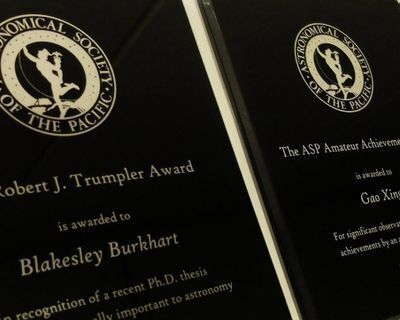Nominations for the 2026 ASP Awards open February 3 through March 31
-
The Robert J. Trumpler Award will be given in 2026

2025 Robert J. Trumpler Award is given to Justin Myles, a recent recipient of a PhD degree, for his contributions to his landmark contributions to observational cosmology.
San Francisco, California- September 10, 2025 - The Robert J. Trumpler Award is presented to a recent recipient of a PhD degree whose research is considered unusually important to astronomy. The recipient of the 2025 Robert J. Trumpler Award is Dr. Justin Myles, who received his doctorate in physics from Stanford University and is currently a Brinson Fellow at Princeton University. Myles’ landmark contributions to observational cosmology were summarized by one of his nominators, who wrote, “his research record and profile are at the core of what we need in order to make the upcoming generation of cosmological galaxy surveys a success.”
Dr. Myles’ groundbreaking doctoral research focused on his development of a new technique for calibrating the distances to galaxies measured through optical surveys using a fraction of the spectroscopic data required by other methods. These are galaxies exhibiting exceedingly small shape distortions due to their weak lensing effects, and the enormous and urgent challenge faced by large-scale surveys of galaxies was the prohibitive cost required to calibrate distances through the available methods of spectral analyses. Myles’ method proved efficient and highly successful when applied to the Dark Energy Survey (DES) of 300 million galaxies conducted in Chile. The DES was the largest optical survey performed at the time and a precursor to the transformative work to be undertaken by the Vera C. Rubin Observatory and its large-scale survey of tens of billions of galaxies visible from the Southern Hemisphere. Myles’ methodology is being adopted for the Vera C. Rubin survey – the Legacy Survey of Space and Time (LSST) – which will help reveal the nature of dark matter and dark energy. As one of his nominators for the 2025 Trumpler Award stated, “he is uniquely positioned to make significant contributions to lensing redshift calibration with LSST data.”
A second focus of Myles’ dissertation was the development of methods for determining the number of galaxies within a cluster. For optical surveys, like DES and LSST, the challenge is that galaxies are often viewed in projection along the line of sight which produces overestimates in their numbers. To get precise counts, projection effects must be precisely quantified which is beyond current capabilities, representing a tremendous problem for cosmologists. Myles solved the problem by examining existing data on galaxy clusters derived from optical catalogs and the corresponding results from spectroscopy made by the Sloan Digital Sky Survey. His insightful empirical analysis of the data has led him to develop numerical methods for modeling galaxy counts in clusters more accurately.
Justin Myles is the co-author of publications with a total of 4,784 citations. As a testament to the importance of his work, Dr. Myles was a finalist for the American Physical Society’s Cecilia Payne-Gaposchkin Award for outstanding astrophysics thesis. He has also recently received Princeton University’s prestigious Henry Norris Russell Fellowship and Future Faculty Fellowship where he is currently a postdoctoral researcher.
About the Robert J. Trumpler Award
For a recent PhD thesis considered unusually important to astronomy
The Robert J. Trumpler Award is given each year to a recent recipient of the PhD degree in North America whose research is considered unusually important to astronomy.
Please contact the Awards team if you have questions about the nomination process

